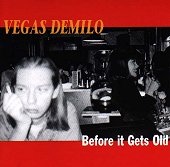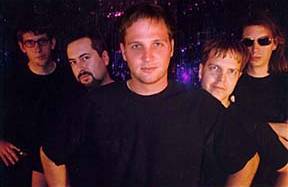INTERVIEW: Vegas DeMilo
San Francisco Power-Pop Quintet (Vegas DeMilo's webpage)
By: Alex Steininger

 With no distribution, no label to support them (except Starving Cowboy Records, their own label), and day jobs to hit during the weekdays, it can be hard to get your music out there. But, not discouraged by the big things that can hold you down, San Francisco's Vegas DeMilo hit the open road on the weekends playing the music they love and trying to sell a few CD's while they're at it. Meeting at a downtown book store (Portland's world famous Powell's Books), the band and I talked about their sophomore album (BEFORE IT GETS OLD), touring, and music in general.
With no distribution, no label to support them (except Starving Cowboy Records, their own label), and day jobs to hit during the weekdays, it can be hard to get your music out there. But, not discouraged by the big things that can hold you down, San Francisco's Vegas DeMilo hit the open road on the weekends playing the music they love and trying to sell a few CD's while they're at it. Meeting at a downtown book store (Portland's world famous Powell's Books), the band and I talked about their sophomore album (BEFORE IT GETS OLD), touring, and music in general.In Music We Trust: What are some of your musical influences?
Foster (vocals): Elvis Costello, The Cars...
Doug (guitar): Replacements, Husker Du...
Foster (vocals): Replacements.
IMWT: What are your band goals for 1999?
Foster: Quit our day jobs.
Brad (guitar): Get a record deal!
Steve (drums): Get famous!
Foster: Start making our next record. Actually, that's my number one goal, to have a record out by January. Or, should I say my number one fantasy.
(whole band laughs)
Doug: If we started today, we still wouldn't be done by January.
Brad: We might have the pre-production done, though.
IMWT: Is Staving Cowboy Records your own label?
Steve: Yeah!
IMWT: Starving Cowboy has two releases, is the other one your debut album?
Steve: Yep. Imagine that. (laughter)
Doug: There is a whole slew of artists waiting to be signed, they just haven't' made the cut yet. (laughter)
Foster: They just haven't slept with the right person yet. (laughter)
Brad: Actually, the new Guns 'n' Roses record is coming out on Starving Cowboy. (laughter)
IMWT: The one with Tommy Stinson on bass?
Foster: Oh Tommy...he needs the cash, though. His last band Perfect didn't do so well.
Doug: Matter of fact, I've never found that record in any record store.
IMWT: Who distributes Starving Cowboy?
Doug: At the moment, we do. Although, the woman that we work with is going to hopefully hook us up.
Foster: We had a distributor on the first record, but then we realized with distributors you never get paid. So, when you do it yourself, you don't get as wide, but you actually see some money. Which is always nice.
IMWT: Is your record available in Portland?
Alec (bass): It will be after today. Actually, we were hoping you could help us out with some good record stores that we can go into to get our record on consignment.
IMWT: We've got Ozone right across the street, Jackpot! up on 33rd or so and Hawthorne...Isaac, the guy who owns Jackpot! is a great guy. Go in there and talk to him. He's amazing. There is also Music Millennium, the biggest indie chain in Portland on 23rd and Johnson, and Everyday Music on Sandy and three blocks up on Burnside.
Alec: At the moment though, to answer your question, we're doing it ourselves because we saw no money from the last album.
IMWT: Do you have a favorite off of BEFORE IT GETS OLD?
Foster: I think we have five different favorites.
Brad: My favorite is "Aftermath".
Doug: Cool, that's my favorite too.
Foster: We're actually still mixing some of the songs.
Doug: We just did a re-mix of "All I Ever Wanted" for a local radio compilation they're putting out this summer.
IMWT: So you all have day jobs you have to take off from to tour?
Foster: Yeah, we do. Doug actually engineered most of this record. That's his day job. He's got a cool day job.
IMWT: Do you just do quick tours then because of your jobs?
Foster: Yeah, we try to tour in little three and four day segments. It's like being in the army reserves, once a month we're out there. (laughter)
IMWT: Have you ever attempted a month long tour or do you have plans to do so?
Foster: I'd like to do it, but we don't have national distribution for our record now, so we just work the country in stages. When the record was first released we worked Northern California, which has a whole bunch of markets, and once we did that for a few months we started on Los Angeles, Portland, and Seattle. Once we've done all those areas, up until NxNW, we might branch out and play other markets. But, to do that, you need national distribution and you have to go out for three weeks and play every night.
IMWT: If you could change anything as a band, would you?
Doug: I would change not returning the rental van yesterday.
Foster: Oh yes! Doug: Got time for a little story?
IMWT: Yeah.
Doug: This involves one of our rules for the road that we made up. If you have a van that will still roll down the highway, and it is filled with gear, don't go back to the rental place -- even if the wheels wobble -- because you're going to get fucked. Guaranteed! Anywhere you go...
 Foster: We took it back because the wheel was shaking, we waited for like three hours, and ended up not getting the same van. They were very unsympathetic. On top of it all, we had a hard time fitting all our gear in it. So, it took us six hours to get down here from Seattle, traffic was terrible. We would change that. But, besides that, we wouldn't change a thing. We've been together for two years; you kind of have to go through the bad experiences to learn, so we wouldn't change a thing.
Foster: We took it back because the wheel was shaking, we waited for like three hours, and ended up not getting the same van. They were very unsympathetic. On top of it all, we had a hard time fitting all our gear in it. So, it took us six hours to get down here from Seattle, traffic was terrible. We would change that. But, besides that, we wouldn't change a thing. We've been together for two years; you kind of have to go through the bad experiences to learn, so we wouldn't change a thing.
IMWT: What are the highest and lowest points the band has experienced so far?
Doug: One of our highest points was our record release party. That was great; it was huge. It was a lot of fun. We played this club called Paradise Lounge downtown. We had go-go dancers and everything.
Foster: It was so packed you could literally walk across people's heads from front to page. It was amazing.
IMWT: How many people does it hold?
Doug: The list says 600, but with balcony and everything, there was a lot more than that at the show.
Brad: Then they paid us $75 bucks after the show, and that was a low point. (laughter)
Foster: The first time you hear your song on the radio, that is a high point. I remember the first time I heard that, I almost crashed my car into the Bay Bridge. I still freak out every time I hear our songs on the radio.
Steve: A low point, right? It's high and low points?
IMWT: Yeah.
Steve: A low point would be dropping all our gear off the loading docks.
Foster: Oh, yeah! This is a good one.
Steve: It's not that good.
Foster: The morning we were going to start doing demo's for this record, we went to our rehearsal space and there is this five foot loading dock. We were putting stuff into the van and I heard this amazing crash, and then a scream.
Steve: Not having done a lot of touring previously, I just had soft-shell, nylon cases for my gear. I had this nice kit...
Foster: It was!
Steve: ...and they had these loading carts and this big door that comes down. I put the cart outside the door and turned around to close it and I just heard this big bang! It was crap.
Foster: That was a bad period in the band. We were going through a drummer a week, and every time we played, literally, for at least a six-month period, every time we rehearsed or played, it would rain. As soon as we started to unload gear, it would rain.
IMWT: What made you want to be in a band?
Steve: It's an addiction. Whether in a band or not, I'll be playing music for as long as I can.
Foster: Your influences. I mean, I would love to make a record as great as [Elvis Costello's] THIS YEAR'S MODEL. You know what a perfect record sounds like, so you're always striving to make a record as great as that. You think, if you work hard enough, you can achieve that.
IMWT: What inspires you to write songs? Life? Humor?
Foster: Well, a lot of the songs on this record are about when Alec and I moved to San Francisco and started the band. Basically, they are about all the things that happened the first two years the band was actually together.
Steve: Being in a band is a weird life. After awhile, you get so used to it. I mean, I couldn't imagine myself not being in a band. It's definitely a weird existence. You find yourself in a lot of weird situations, like loading gear at 4am when you have to go to work the next morning.
IMWT: What do you want the listener to get out of the music?
Doug: A little bit pain and a lot of love.
Alec: I don't know, it's hard to say. You just do the thing and hope people like it. Music is a very selfish thing. You do it for yourself; you make the record for yourself and hope everyone likes it. Of course, that is never going to happen. So, you just hope someone will like it. I've played enough shows where people are generally indifferent. It's hard to get over the wall of indifference, but if you can get five people to come up to you after the show and say, "that was really great," then it is worth driving three hours to play a show to a few people. It makes you feel good.
Brad: People come up to you after the show because they can relate to the songs; either it's something they've experienced and dealt with or they're just energized by the music. We both those things; people come up for the music and the lyrics.
Steve: For me, if someone is going on a long trip and only have room in their box for ten CD's, I'd like to be one of those ten CD's that they say, "I have to have one of these with me." Even if it's a trip to the store, it doesn't matter.
Foster: Hopefully it's not a trip to the used record store. (laughter). You wanna no low points and high points? One of the high points was when I went to the record store and actually saw our CD for sale. And one of the low points was seeing it in the used bin for a $1.99.

